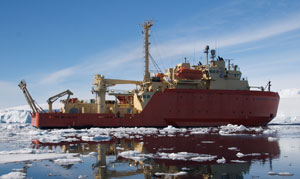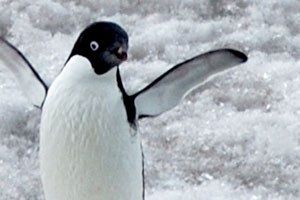 |
Embargoed until 2 p.m., March 12, 2009
Contacts:
Diana Kenney, Marine Biological Laboratory, 508-289-7139; dkenney@mbl.edu
Ken Branson, Rutgers University, 732-932-7084, x633; kbranson@ur.rutgers.edu
From Phytoplankton to Penguins: Climate Change is Altering Food Web from Bottom Up in Western Antarctica
 |
|
 |
Resources:
Citation: Montes-Hugo, M., et al. (2009) Recent Changes in Phytoplankton Communities Associated with Rapid Regional Climate Change Along the Western Antarctic Peninsula. Science 323, 1470-1473.
Complete article (PDF)
Rutgers University press release
View the web animation (courtesy of the American Museum of Natural History)
Background information: “New Ecosystem is Forming as Western Antarctica Rapidly Warms: Loss of Sea Ice is Changing the Food Web”
NSF Long-Term Ecological Research Project at Palmer Station, Antarctica
Photos:
Click thumbnails for high-resolution image:

The ARSV Laurence M Gould, a research vessel used for studies at Palmer Station, Western Antarctica. Photo credit: Andrew McDonnell, Woods Hole Oceanographic Institution.

An Adelie penguin. Photo credit: Timothy Russer, TSGT, USAF, National Science Foundation
|
MBL, WOODS HOLE, MA—Climate change is driving large-scale, bottom-up changes in the food web in Western Antarctica, reports a team that includes Hugh Ducklow, co-director of the Ecosystems Center at the Marine Biological Laboratory (MBL), in this week’s issue of Science.
Summertime (December to February) levels of phytoplankton—the foundation of the food web—have decreased by 12 percent over the past 30 years off the Western Antarctic Peninsula (WAP), reports the team, which was led by Martin Montes-Hugo of the Institute of Marine and Coastal Sciences at Rutgers University.
“We’ve known for some time about many climate and food-web changes in this region,” says Ducklow, including rapidly decreasing populations of species that depend on sea ice for habitat, such as Adélie penguins and krill.
“What we didn’t know until now was that phytoplankton are also responding to climate changes,” Ducklow says. “That’s very important.” Now, it is clear that climate changes at the WAP are creating pressure on the food web from both the top down (the loss of sea-ice habitat affecting predators) and the bottom up (changes in phytoplankton abundance and composition).
The Western Antarctic Peninsula is one of the most rapidly warming regions on Earth. The average winter temperature in the region has increased by 6 degrees C (11 degrees F) since 1950; and a 90-day loss of average annual sea-ice cover has been observed since 1978. More than 80 percent of the glaciers on the WAP are in retreat.
Montes-Hugo analyzed 30 years of satellite and field data on ocean color, temperature, sea ice, cloud cover, and wind speed to determine the changes in phytoplankton along the WAP. “Everyone thinks of climate change as warming temperatures, but a whole series of changes are happening,” says Ducklow. “The warming is melting sea ice. But changes in winds and cloudiness are also impacting the ecosystem by melting the sea ice and changing the surface mixed layer in the ocean, which affects phytoplankton growth.”
This paper stems from work done as part of the National Science Foundation Office of Polar Program’s Long-Term Ecological Research (LTER) project at Palmer Station, Antarctica. Hugh Ducklow is the principal investigator of the Palmer LTER. Besides Montes-Hugo and Ducklow, the paper’s co-authors are Oscar Schofield, Rutgers University’s Institute of Marine and Coastal Sciences; Scott C. Doney, Woods Hole Oceanographic Institution; William Fraser, Polar Oceans Research Group, Sheridan, Montana; Douglas Martinson, Columbia University’s Lamont-Doherty Earth Observatory; and Sharon E. Stammerjohn, University of California at Santa Cruz.
The MBL is a leading international, independent, nonprofit institution dedicated to discovery and to improving the human condition through creative research and education in the biological, biomedical and environmental sciences. Founded in 1888 as the Marine Biological Laboratory, the MBL is the oldest private marine laboratory in the Western Hemisphere. For more information, visit www.MBL.edu
|